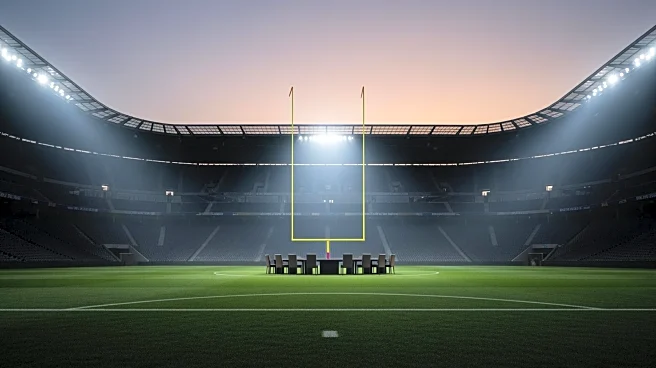What's Happening?
NFL teams across the nation are observing a moment of silence in memory of Marshawn Kneeland, a defensive end for the Dallas Cowboys who tragically passed away at the age of 24. Kneeland died by a self-inflicted
gunshot wound in Texas, prompting the NFL to send a memo to teams requesting the tribute before games. The observance took place in various locations, including Berlin before the Atlanta Falcons and Indianapolis Colts game, and Denver before the Broncos and Las Vegas Raiders game. Kneeland was a second-round draft pick in 2024 and had recently played in a game against the Arizona Cardinals, where he scored his first career touchdown.
Why It's Important?
The death of Marshawn Kneeland highlights the critical issue of mental health within professional sports, particularly in the NFL. The league's decision to honor Kneeland with a moment of silence underscores the importance of addressing mental health challenges faced by athletes. This event may prompt further discussions and initiatives aimed at providing better support systems for players dealing with mental health issues. The public service announcement accompanying the tribute encourages those struggling to seek help, potentially raising awareness and reducing stigma around mental health in sports.
What's Next?
The NFL's tribute to Marshawn Kneeland may lead to increased efforts to support mental health initiatives within the league. Teams and players might engage in more proactive measures to ensure mental health resources are accessible to athletes. Additionally, the league could consider implementing educational programs to help players recognize and address mental health challenges. Stakeholders, including team management and mental health professionals, may collaborate to develop comprehensive support systems for athletes.
Beyond the Headlines
The tragic passing of Marshawn Kneeland could spark broader conversations about the pressures faced by professional athletes and the need for comprehensive mental health care. This incident may lead to a reevaluation of how mental health is addressed in sports, potentially influencing policies and practices beyond the NFL. The cultural impact of this event might extend to other sports leagues, encouraging a more open dialogue about mental health and the importance of seeking help.









